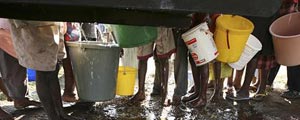
The continued rise in diarrhoea and new suspected typhoid cases in Harare are indications that issues of hygiene and access to clean potable water are still out of reach for many residents with many resorting to unprotected sources.
By Phyllis Mbanje
Mushrooming of food vendors has also raised questions on improper handling of food items, which are being cooked and sold on street pavements with no checks whatsoever in place.
A recent weekly disease surveillance report from the Ministry of Health for the week ending May 17, indicated there were 9 985 cases of diarrhoea reported in that week and six deaths. As of that same date since the beginning of the year, over 190 000 cases had been reported and 197 people died from diarrhoea.
Under the same period, there were 36 new suspected cases of typhoid, and 33 of those were in Harare with the remaining from Nyanga district.
As of that date there has been 301 confirmed typhoid and 559 suspected cases.
Typhoid fever, according to the Centres for Disease Control and Prevention (CDC), is a potentially life-threatening illness caused by the bacterium Salmonella typhi (S.typhi).
Salmonella typhi lives only in humans. Persons with typhoid fever carry the bacteria in their bloodstream and intestinal tract. In addition, a small number of persons, classified as carriers, recover from typhoid fever, but continue to carry the bacteria.
- Chamisa under fire over US$120K donation
- Mavhunga puts DeMbare into Chibuku quarterfinals
- Pension funds bet on Cabora Bassa oilfields
- Councils defy govt fire tender directive
Keep Reading
Both ill persons and carriers shed the bacterium in their faeces.
A person can get typhoid fever if they eat food or drink beverages that have been handled by a person who is shedding S.typhi or if sewage contaminated with the bacteria gets into the water used for drinking or washing food.
“Typhoid fever is more common in areas of the world where hand washing is less frequent and water is likely to be contaminated with sewage,” a fact sheet from CDC said.
Typhoid fever can be successfully treated with appropriate antibiotics, and persons given antibiotics usually begin to feel better within two to three days.
Although city health director Prosper Chonzi could not be reached for comment, in a previous interview he alluded to the fact that they were aware of the food vendors, but had no adequate staff to deal with the issue.
“We are therefore imploring members of the public to exercise restraint and not buy food from the street because no one knows how it is prepared or if it is under the required conditions,” he said.











